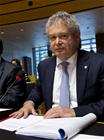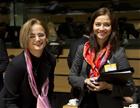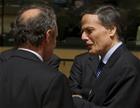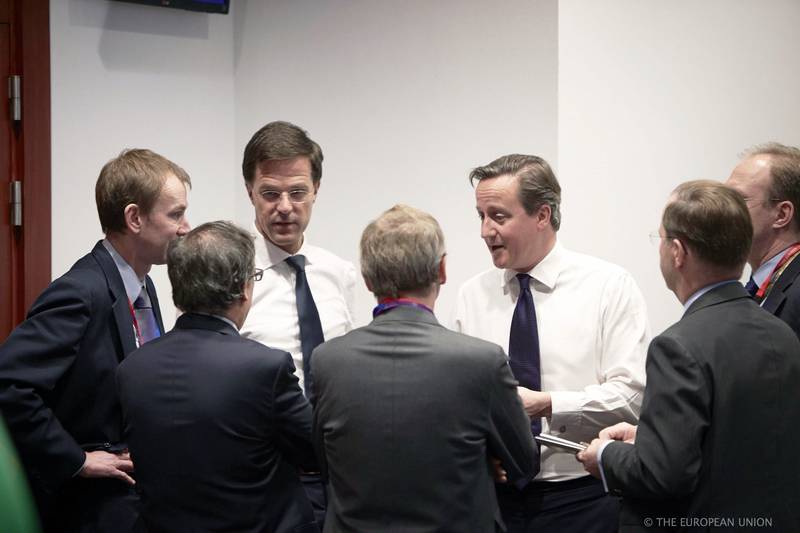Nothing Is Agreed Until Everything Is Agreed
Adelina Marini, October 25, 2012
 On November 5th, European Council President Herman Van Rompuy will begin a tour in the EU member states for last consultations on the national positions before a key and extraordinary EU summit on November 22-23, dedicated entirely on the negotiations on EU Budget 2014-2020, at the moment entirely blocked and without any perspectives for rapprochement of positions among the groups of interests. The issue of the multiannual financial framework for the next 7-year period is gaining speed with the deadline for reaching an agreement (the end of the year) quickly approaching. The Cypriot EU Presidency is expected to present a revised negotiating box, as is known the package of positions on the separate elements of the negotiations.
On November 5th, European Council President Herman Van Rompuy will begin a tour in the EU member states for last consultations on the national positions before a key and extraordinary EU summit on November 22-23, dedicated entirely on the negotiations on EU Budget 2014-2020, at the moment entirely blocked and without any perspectives for rapprochement of positions among the groups of interests. The issue of the multiannual financial framework for the next 7-year period is gaining speed with the deadline for reaching an agreement (the end of the year) quickly approaching. The Cypriot EU Presidency is expected to present a revised negotiating box, as is known the package of positions on the separate elements of the negotiations.
Eat the whole cake
Apart from the general discussions in the Council, intensive negotiations are taking place in various groups of interest. The two main parties in the negotiations are the groups "Friends of Cohesion" and "Friends of Better Spending". However, a unification can be seen on many of the points in the negotiations in the framework of the Visegrad Four which is more and more often coming up with joint declarations. To the equation we have to add the European Parliament which the Lisbon Treaty provided with a more responsible role in the negotiations on the European budget. The Parliament is one of the strongest voices in the negotiations. Together with the discussions in the Council of the EU, the debates has begun in the European Parliament on the report of the two Strasbourg rapporteurs - Ivailo Kalfin, a Bulgarian MEP from the group of Socialists and Democrats, and German MEP Reimer Böge (EPP).
Their report has already been adopted in the Budget Committee and a resolution of support for the report was approved with great majority in the plenary this week. In general the text of the document clearly shows that the European Parliament wants to achieve the impossible - to eat the whole cake and the cake to still be there. On the one hand it is pointed out that, indeed, the negotiations are taking place in a very tough economic context and this is why there is a need of capping spending, but in the same time the EU budget is also around 3% of the general spending of the member states which makes it 45 times smaller than the sum of all spending in the member states, the draft reads. The Parliament reiterates its position that the EU budget is for investment and that 94% of the general revenues are invested in the member states themselves.
The report does not accept the European Commission proposal for freezing of the budget at the 2013 levels because this would not be sufficient to finance the political priorities, mainly related to the Europe 2020 strategy. Unless adequate funding is ensured above the Commission proposal, some priorities and policies will have to be abolished which, however, will not lead to the desired result, as rapporteur Ivailo Kalfin told euinside in an interview recently. The Parliament is sceptic also in terms of the proposal to introduce an ex-ante conditionality, the purpose of which is to ensure the effective absorption of the EU funds, especially the money from the Cohesion Fund, the structural funds and the fund for rural areas and fisheries. According to the EP, there is no direct link between the implementation of the Regional Policy and the macro-economic results as the Commission claims - the countries whose macro-economic results are not good to be deprived of EU money. The EP again underlines that this would be a punishment for the regions.
Cohesion Policy
This is the most disputable part of the MFF 2014-2020 negotiations because it  covers a significant sum in the Commission proposal and also involves several EU funds: the European Regional Development Fund, the Fund for Agriculture and Rural Development, the Maritime and Fisheries Fund. Several other programmes are also part of the cohesion policy package, among which the European Globalisation Adjustment Fund, the Programme for Territorial Cooperation, etc. The negotiations on the Presidency's "box" are taking place after the following principle - nothing is agreed until everything is agreed. The main problem, though, that blocks the negotiations is the amount.
covers a significant sum in the Commission proposal and also involves several EU funds: the European Regional Development Fund, the Fund for Agriculture and Rural Development, the Maritime and Fisheries Fund. Several other programmes are also part of the cohesion policy package, among which the European Globalisation Adjustment Fund, the Programme for Territorial Cooperation, etc. The negotiations on the Presidency's "box" are taking place after the following principle - nothing is agreed until everything is agreed. The main problem, though, that blocks the negotiations is the amount.
But nonetheless, negotiations are taking place on separate elements. On the eve of the 18-19 October European Council, the third package of elements of the Cohesion Policy (the 3rd partial approach) was discussed at the General Affairs Council. That package covers 7 thematic blocks: information and communication, and technical assistance; European territorial cooperation; territorial development; financial issues that are not part of the negotiations on the MFF; country-specific recommendations; management and control. On all of them there were statements in the public part of the debates by 9 countries - the three Baltic states, Italy, Hungary, Poland, Slovenia, Malta, Britain. Most of the representatives raised various issues.
The Baltic states for instance - Latvia, Lithuania and Estonia - spoke about information, communication and technical assistance, the purpose of which is to promote Cohesion Policy and to inform potential beneficiaries about the opportunities for funding and to provide assistance for preparation of projects on all the five funds. The representative of Lithuania expressed concern from the proposed 7% cap for technical assistance within the cohesion funds because this is less than the 10 percent technical  assistance envisaged for other funds. According to him, the funds have to be treated equally. He underlined that this was not about getting additional funding but about avoiding excessive administrative burden.
assistance envisaged for other funds. According to him, the funds have to be treated equally. He underlined that this was not about getting additional funding but about avoiding excessive administrative burden.
He was supported by his colleagues from Estonia and Latvia with the same argument that it was important to avoid excessive bureaucracy and administrative hurdles. The Estonian representative was even emotional in his statement, asking the Presidency and the Commission to realise that a distinction among the funds was not necessary. "We will not save money this way, we will only create new unnecessary rules and restrictions. Please do show some flexibility", the Estonian permanent representative in the EU, Matti Maasikas said.
To this request EU Regional Development Commissioner Johannes Hahn responded by saying that he understood the desire for a general percentage level for technical assistance instead of putting many exceptions. But he underscored that it mattered whether technical assistance was provided on the cohesion or the social fund. "We are not interested in too much money to be used for technical assistance because this would mean more money for administration and that is not to the interest of the European citizens and taxpayers".
Poland spoke on behalf of the countries in the Visegrad Four, which includes also the Czech Republic, Slovakia and Hungary. The four countries and Slovenia held a meeting in the Polish town of Katowice before the General Affairs Council to coordinate their positions. Pyotr Sarafin, Poland's state secretary in the Ministry of Foreign Affairs, announced the support of the five countries for all mechanisms aimed at improving the cohesion policy and increasing efficiency, noting the significance of the territorial approach (to focus funds in less developed regions). Mr Sarafin also said that the debate on the budget for the next period had to continue in the context of better  spending. This is an interesting statement, given that the Visegrad countries and Slovenia take part in another group - Friends of Cohesion, although the latter claimed a number of times that they were friends of better spending as well.
spending. This is an interesting statement, given that the Visegrad countries and Slovenia take part in another group - Friends of Cohesion, although the latter claimed a number of times that they were friends of better spending as well.
Italy has expressed reserves on another block in the package - financial issues. It is the possibility to transfer funds from one category of regions to another and for the condition of additionality, meaning that support from the EU cannot replace national spending. On this issue Italian European Affairs Minister Enzo Milanesi said that he felt lonely in those negotiations His country was in neither of the groups that had formed in the course of the negotiations so far. Sometimes a friend of cohesion but in the same time going on well with the supporters of better spending as well, who, as it became clear, quite often include fans of cohesion too. Closest to Italy, in terms of positions, is the European Commission, as Mr Milanesi told his colleagues. He said that too big a flexibility was proposed - instead of 5%, 10% of the money to be allowed to be transferred from one category to another.
Italy expresses reserves also in terms of additionality, saying that the Presidency was retreating from already agreed positions. In the minister's words, there were regions that had to receive more money than in the past. Such, for instance, are the transition regions - those that have come out of the level of poverty but still are not sufficiently developed to remain without assistance. On this issue Commissioner Hahn said that additionality should not be perceived as a burden but as an incentive for additional investments by the member states.
Malta for its part disagreed with the balance between the country-specific recommendations and the national reforms programmes. The dispute is about which should be prevalent - the national reforms programmes, prepared by the member states, or the country-specific recommendations, prepared by the European Commission - in ensuring a link between the EU strategy for growth and jobs  and cohesion policy. This dispute seems small at a first glance but there are countries that insist on them. Malta is of the opinion that national reforms programmes should be prevalent because they are better targeted and provide a better picture of the situation in a country. On this issue Hungary said that it accepted the compromise offered by the Presidency for a balance between the two types of programmes but expressed fears that given the publication of these programmes is every year, this could lead to changes of the convergence programmes and that would contradict to the multiannualism of the budget.
and cohesion policy. This dispute seems small at a first glance but there are countries that insist on them. Malta is of the opinion that national reforms programmes should be prevalent because they are better targeted and provide a better picture of the situation in a country. On this issue Hungary said that it accepted the compromise offered by the Presidency for a balance between the two types of programmes but expressed fears that given the publication of these programmes is every year, this could lead to changes of the convergence programmes and that would contradict to the multiannualism of the budget.
Commissioner Hahn assured a number of times that the Commission had no intention to change things every year but insured himself saying that 7 years is a long period of time which must allow for some minor changes.
As usually, Britain's statement was interesting and different. The country's representative, David Lidington, a state minister in the Ministry of Foreign Affairs, said that for his country a major priority remains the size of the budget and this is precisely what will determine all the other positions of Britain. He said he was disappointed that  there was not a more ambitious approach in terms of common indicators for the development fund. This is the seventh block in the package discussed on October 16th in the General Affairs Council and is related to the provision of instruments for assessment of the impact of European support. According to Lidington, there are precise indicators for efficiency of the social fund and the agricultural fund, while for the European Fund for Development there were no indicators. He added that the Commission had the necessary skills and fantasy to propose appropriate tools for territorial cooperation as well.
there was not a more ambitious approach in terms of common indicators for the development fund. This is the seventh block in the package discussed on October 16th in the General Affairs Council and is related to the provision of instruments for assessment of the impact of European support. According to Lidington, there are precise indicators for efficiency of the social fund and the agricultural fund, while for the European Fund for Development there were no indicators. He added that the Commission had the necessary skills and fantasy to propose appropriate tools for territorial cooperation as well.
Bulgaria
The country was not among those who spoke at that General Affairs Council, where it was represented by Foreign Minister Nickolay Mladenov. According to a euinside source, close to the negotiations, Bulgaria had come up with a new position for the 2.5% capping of the spending for cohesion policy. This is a novelty in the  negotiations of the multiannual framework the purpose of which is to save money on the basis of available data for the absorption rates during the current framework (2007-2013). The formula for calculation of the capping envisages from the total allocation for a country for the period 2014-2020 2.5% of the GDP per capita and PPS of the country for the period 2008-2010 to be deduced. For that period Bulgaria's GDP per capita PPS was 44%. In general, the countries that have a lower than 75% of the EU average gross national income are eligible for support under the cohesion policy and those are most of the new EU member states and some regions in the old ones.
negotiations of the multiannual framework the purpose of which is to save money on the basis of available data for the absorption rates during the current framework (2007-2013). The formula for calculation of the capping envisages from the total allocation for a country for the period 2014-2020 2.5% of the GDP per capita and PPS of the country for the period 2008-2010 to be deduced. For that period Bulgaria's GDP per capita PPS was 44%. In general, the countries that have a lower than 75% of the EU average gross national income are eligible for support under the cohesion policy and those are most of the new EU member states and some regions in the old ones.
Recently, in an interview for euinside Tomislav Donchev, minister for EU funds, said that Bulgaria defended a differentiated approach but he did not give any further details. According to our source, however, the country has tabled quite a concrete proposal - for the countries with GDP PPS less than 50% the 2.5% capping to be removed. At this stage we do not have an official confirmation, aside from the recall that Bulgaria supported the differentiated approach. At a conference on October 23rd in Sofia, organised by the European institute, the foreign minister reiterated that the differentiated approach had to be bound to the economic development of countries. But he underscored that this differentiation had to be based on a clear and exact analysis how this can be done.
For his part, Minister Donchev was confident that Bulgaria would manage to absorb one third of the EU funds, allocated for the country in this financial period. This position raises two questions. One is - does the government admit that in the next 7 years, until 2020, the country will not be able to pass the level of 50% of GDP PPS given that at the moment it is 55% from EU average or some 45 per cent? Does Bulgaria believe that it can ensure a larger absorption rate, given the expected "weakest result of one third", to justify its position that the 2.5% capping must be removed because it will be reached?
 Kristalina Georgieva | © Council of the EU
Kristalina Georgieva | © Council of the EU Mark Rutte, David Cameron | © Council of the EU
Mark Rutte, David Cameron | © Council of the EU | © European Parliament
| © European Parliament